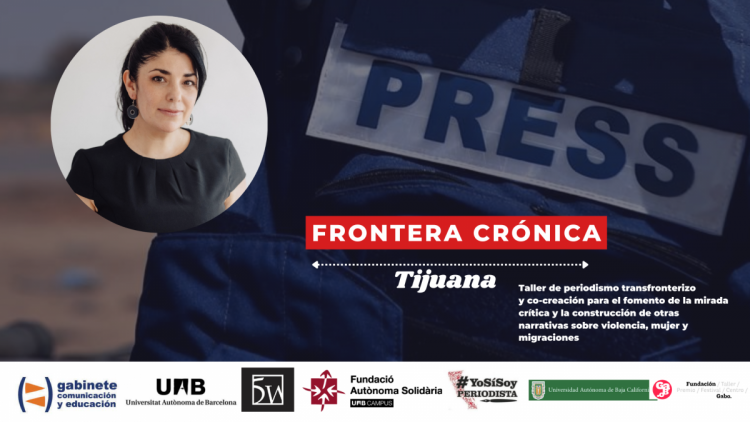The journalist Carolina Escudero, collaborator of the Gabinete de Comunicación y Educación, joins the project ‘Frontera Crónica: Cross-border journalism and co-creation workshop for the promotion of a critical view and the construction of other narratives on violence, women and migrations‘. Escudero is a journalist and expert in social psychology of the media, her main line of research being communication and emotions.
Carolina Escudero has specialised in Social Psychology (PhD and postdoc, JFK University, Argentina), Sexual Difference (MA, University of Barcelona), Journalism (BA, Université Robert Schuman, France). Her research area focuses on the role of emotions in journalistic production (trauma, vicarious trauma, empathy with sources, self-care of journalists) in the mediatisation of cases of enforced disappearances (victims/ re-victimisation, stigma). She teaches seminars and researches on human rights issues, reparation of victims through stories and the emotional health of journalists. She has studied and worked in Argentina, Belgium, Bolivia, China, Spain, the United States, France and the Netherlands. She was awarded the following grants: Leonardo Da Vinci of the European Union (Brussels, 2001); Research and Creativity, University of Missouri, (USA 2018) and Postdoctoral Research UJFK (Argentina, 2021). Research and Solidarity Award, Spain (2017) and distinction for International Journalism, FOPEA Argentina 2013.
In November, and for one year, this project will be developed through two practical workshops, two days of reflection and a series of debates in the border city of Tijuana (Mexico). The project, which has the collaboration of the Gabo Journalism Foundation, the Baja Autonomous University of Baja California (Tijuana) and the Mexican journalists’ network “Yo sí soy periodista” has established 5 lines of action: to promote cross-border journalism, to change spaces for reflection, co-creation and debate with journalists in Mexico, to modify news coverage of migratory movements, to contribute to different and rigorous news coverage and to create journalistic stories that raise awareness among the population, to contribute to promoting the narrative of stories of women leaders, transformers and generators of social change and to provide journalists with tools, platforms, networks and resources to react to complicated situations arising from threats, aggression or other types of conflict.
The working team is made up of the following journalists and teachers: Santiago Tejedor, teacher and head of the project, Martín Caparrós, Argentine journalist and chronicler, David Jiménez , journalist and writer, Agus Morales , director of 5W , Cristina Pulido , lecturer Serra Húnter of the Department of Journalism and Communication Sciences UAB, María José Recoder , PhD in Information Sciences UAB, Carolina Escudero, associate professor of the Department of Journalism and Communication Sciences UAB, Beatriz Villarejo, PhD in Education UB, and PhD and Master students Kelly Robledo, Belén Sancho and Elena Hita. Also taking part are Diana Denisse Merchant Ley, María de Jesús Montoya Robles, Ángel Cilserio Ruiz Rios and Feliciano Castro Loya from the Faculty of Humanities and Social Sciences of the Autonomous University of Baja California. The co-organising team in Tijuana of the collective “Yo Sí Soy Periodista” is made up of journalists Sonia Elva Rosas de Anda, Alma Yolanda Morales González, Inés García Ramos and José Ibarra Amador.
The Gabinete de Comunicación y de Educación is a consolidated group specialised in scientific research and dissemination, which belongs to the Department of Journalism and Communication Sciences of the UAB. Recognised by AGAUR (Agència de Gestió d’Ajuts Universitaris i de Recerca) of the Generalitat de Catalunya as a Consolidated Research Group on the basis of its trajectory, projection and development, it develops projects and research in the field of convergence between communication and education. Since its creation, it has developed initiatives aimed at integrating, with awareness and freedom, communication technologies in the so-called global or knowledge society. Under the direction of Santiago Tejedor, the Office organises different master’s degrees, such as the Master’s Degree in Travel Journalism (on-site and online), the Master’s Degree in Communication and Education, the Master’s Degree in Environmental Communication and the Master’s Degree in Political and Electoral Communication Management. The group has a wide and varied collection of publications, in the form of scientific articles, books and book chapters, and other works, which is constantly being renewed. It also has a laboratory for teaching innovation projects, transfer and new formats that are conceived and developed from a perspective based on creativity and multidisciplinary work. Every year, the Cabinet organises an academic expedition that travels the world with students from different universities and degrees. This is the Tahina-Can Expedition, which has been awarded as the best educational project in Spain. It also has the portal Tu Aventura, the educational platform infoEDU and the newsgames and science project Reporteros de la ciencia.





